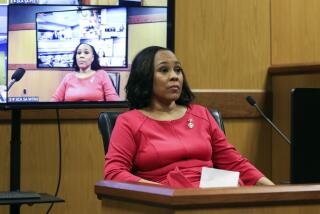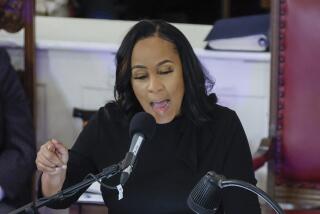Ex-aide details ways he says John Edwards hid affair
GREENSBORO, N.C. — A former aide to John Edwards on Tuesday described the detailed plans he said the former presidential candidate devised to hide his extramarital affair and his mistress’ pregnancy, including accepting money from a wealthy benefactor to pay for his paramour’s expenses.
Andrew Young, the prosecution’s chief witness, testified throughout the second day of the criminal trial against Edwards, who is accused of six counts related to campaign finance violations.
Young testified that he approached a number of Edwards supporters seeking money to pay the living and healthcare expenses for mistress Rielle Hunter, who gave birth to Edwards’ daughter. Young arranged to get help from Rachel “Bunny” Mellon, a wealthy, now 101-year-old Edwards benefactor who earlier had offered to assist the candidate financially after a flap over his $400 haircuts.
Young said Edwards instructed him to tell Mellon the money was for a “non-campaign expense, something that would benefit him.”
Young told Edwards that he felt uneasy about the arrangement. The heiress, seeking to hide the payments from her lawyer, wrote checks to her interior designer — in one case, for $100,000 with a note on the check saying it was for an antique table. The interior designer endorsed the checks over to Young’s wife, Cheri, who signed the checks with her maiden name and deposited them in their personal account.
Edwards assured Young that he had consulted campaign finance lawyers and the transactions were legal.
“It felt and smelled wrong,” said Young, who has been granted immunity from prosecution. “But in the end, we decided he knew more about the law than we did.”
At the same time, Edwards did not want to know all the details about the money from his benefactors, Young testified.
“He said he couldn’t know anything about this in case he got sworn in as attorney general,” Young said, referring to Edwards’ other possible political aspiration if he lost the Democratic nomination.
When Young told his boss that Hunter was pregnant, Edwards reacted angrily, calling her a “crazy slut” and saying there was a “1 in 3 chance” that he was the father, Young said. Edwards pleaded with Young to falsely claim that he was the father of Hunter’s child. Young testified that he agreed to the scheme because “I wanted my friend to be president.”
“By this point,” Young said, “we were in very deep. We had been taking care of and hiding his mistress and lying a great deal.… But we believed in the causes.”
Prosecutors say the money paid by Mellon and another Edwards supporter, the late Fred Baron, was meant to protect Edwards’ image among voters as a family man and preserve the viability of his campaign, thereby making it a political donation in excess of the legal limit.
The defense contends the money was a personal gift from friends, who sought to shield Edwards, his wife, Elizabeth, who died of breast cancer in 2010, and other family members from humiliation.
Hampton Dellinger, a Chapel Hill, N.C., attorney who has been attending the trial, said Young’s testimony Tuesday aided both the prosecution and Edwards. It helped the prosecution show Edwards was involved in efforts to cover up the affair, said Dellinger, who has taught election law.
But it also showed that Mellon “didn’t want anything in exchange for her largess; that makes clear this is not your typical quid pro quo political corruption case,” Dellinger said.
Also helping Edwards, Dellinger said, was that after Young raised concerns up to five times with Edwards about the money arrangements, Edwards said each time that he believed the scheme was legal.
Ken Gross, a Washington ethics lawyer, said the trial was “turning out to be the sordid tale we expected rather than a campaign finance trial.” The testimony so far has “not moved my impression that this case is far beyond the bounds of criminal misconduct,” he said.
The defense is expected to cross-examine Young on Wednesday and is expected to try to portray him as a self-promoter who used a chunk of the Mellon money to build a $1.5-million home in North Carolina.
Edwards, the former North Carolina senator, faces up to 30 years in prison and $1.5 million in fines if he is found guilty on six charges of violating campaign finance laws.
More to Read
Start your day right
Sign up for Essential California for news, features and recommendations from the L.A. Times and beyond in your inbox six days a week.
You may occasionally receive promotional content from the Los Angeles Times.







